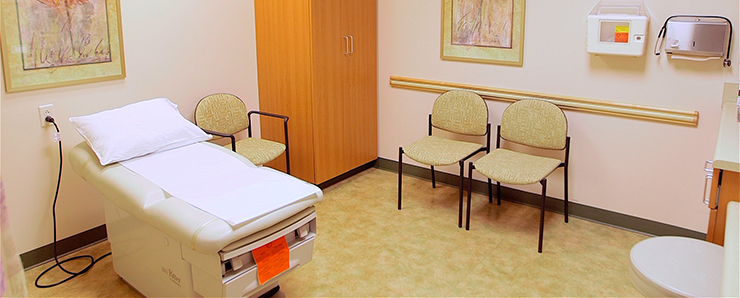When you first hear the “C” word, you may not know what to expect
When you are first diagnosed with cancer, it’s scary, confusing, and overwhelming. A million questions will go through your head as you begin to process your diagnosis. Our team is caring and compassionate and will be there for you every step of the way.
Many people think a cancer diagnosis means treatment must be start as soon as possible, however, the amount and type of treatment options is specific to a number of things, including the type of cancer, the stage, and your overall and personal needs.
After you are diagnosed, you will be referred to a team of cancer specialists who can help provide treatment along your treatment.
You may see any of the following during your treatment:
- A surgeon, who uses surgical procedures to remove/treat cancer
- A medical oncologist, who uses hormones and drugs such as chemotherapy to cancer
- A nurse practitioner, who is an advanced practice nurse who works directly with patients.
- A radiation oncologist, who is an expert in using radiation to treat cancer

Your first visit
Your first visit may take an hour or more, and you may have to have additional tests, X-rays, or labs taken to help with treatment planning.
What to bring
You’ll want to bring the following items to your first appointments:
- Insurance card and information
- Driver’s license or photo identification
- A list of allergies or medications you are already taking
- A notebook to take notes and write down information
- A family member or friend who can help listen
Your health care team will work together to come up with a plan of treatment that will work best for you and will provide you with a personalized treatment plan after you initial appointments and consultations.
Your treatment options
Common treatment options include:
- Surgery
- Chemotherapy
- Radiation therapy
- Clinical trials
If the tumor or mass can be partially or fully removed through surgery, it is often the first treatment option cancer patients receive. Other treatments, including chemotherapy or radiation therapy, may be used alongside surgery. Surgery and radiation therapy work to remove, kill, or damage cancer in a certain area of the body. Chemotherapy works throughout the entire body.
Medicine may be given by injection, through the mouth, or by an IV placed in the patient’s arm. Patients may also be given a port or catheter before chemotherapy begins. A port device may make it easier to deliver chemotherapy, fluids, or take blood draws. Chemotherapy may be given in cycles with a rest period between treatment and visits. Cycles may take an hour or up to a day. Your team will talk with you about ways to minimize risk and reduce rates of infection and side effects after treatment.
Radiation therapy may be used to treat localized cancers, and is used in more than half of all treatment plans. It damages cancer cells so they cannot grow and may be used alone or with chemotherapy or surgery. There are two methods for radiation treatment: external and internal.
External Radiation
External radiation takes high-energy rays aimed from a large machine called a linear accelerator.
Internal Radiation
Internal radiation takes radioactive implants and places them into the body near the tumor.
Clinical trials are also an option for when standard treatment may not be the best option. Your care team will work together to plan and deliver the best type of treatment for you.
For your protection
The Grand Lake Regional Cancer Center is committed to protecting your privacy, including your medical and personal information. To ensure that the Grand Lake facility complies with the Federal Trade Commission “Red Flag” regulations, we will ask you to provide a driver’s license or photo ID as proof of identity. If the address on your photo ID does not match your current address, we will need proof of address, such as a utility bill in your name. While this may be an inconvenience to you, we have put procedures into place to detect and prevent identity theft of a patient’s identity, especially with regard to their medical and financial records. We also follow HIPAA guidelines and you will be furnished with a copy at your appointment.
